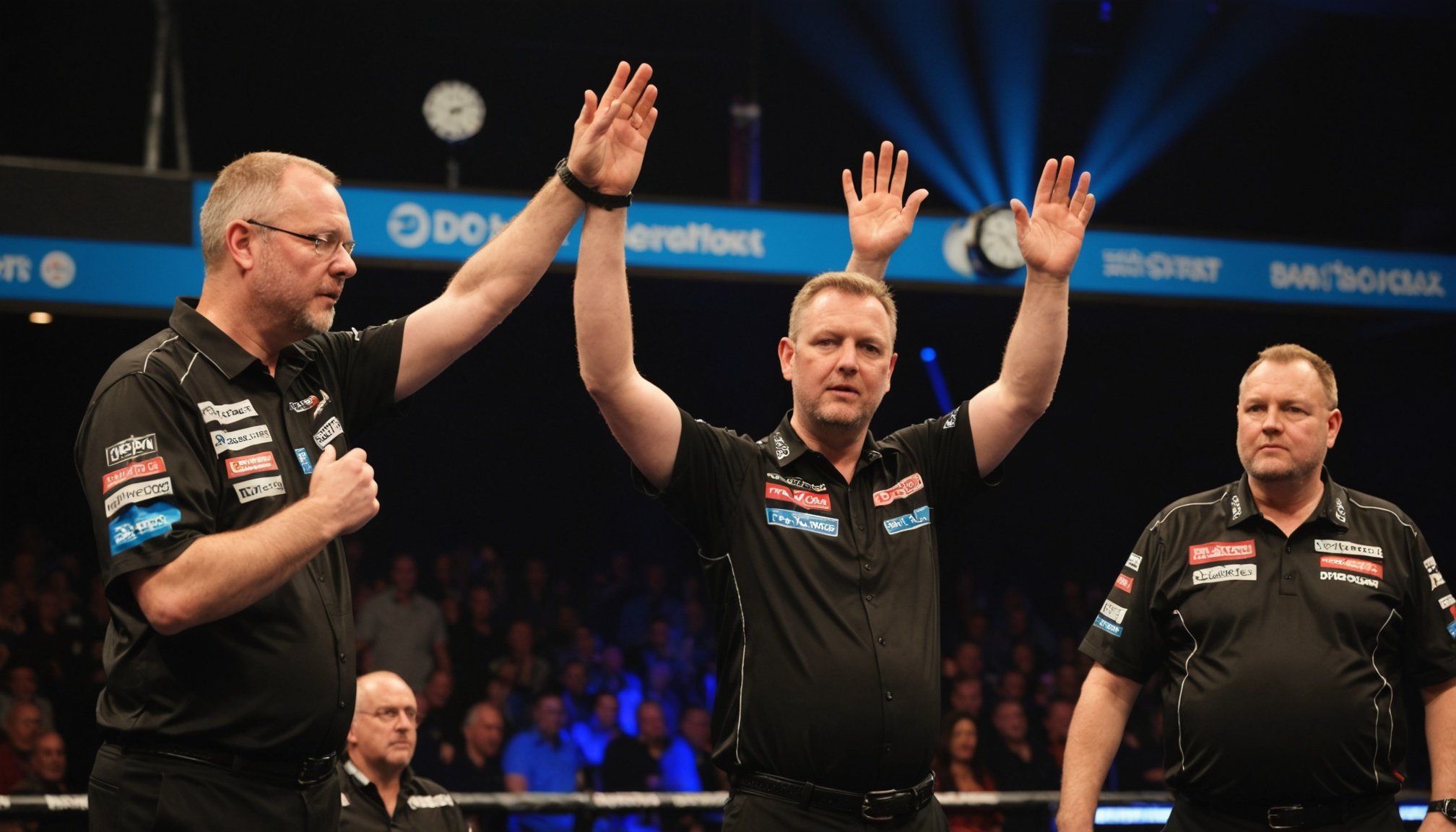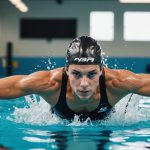Mastering Stress Management and Enhancing Performance: Top Strategies for UK Professional Darts Players
In the world of professional darts, the line between victory and defeat is often drawn not just by physical skill, but by mental resilience and effective stress management. As the sport continues to evolve, UK professional darts players are increasingly recognizing the importance of integrating comprehensive strategies to manage stress and enhance their performance. Here, we delve into the top strategies that are transforming the game.
The Role of Fitness in Stress Management and Performance
While darts may not seem as physically demanding as other sports, the reality is that top players need to be in excellent physical condition to perform at their best. Fitness is no longer a secondary consideration but a core component of a player’s training regime.
In parallel : Top Age-Appropriate Training Techniques for Young Cyclists in the UK
Boosting Stamina and Endurance
Physical fitness plays a crucial role in reducing fatigue, allowing players to remain sharp throughout long and intense matches. Major tournaments like the World Darts Championship involve matches that can last for hours, requiring players to maintain their focus and precision over extended periods. Being physically fit helps players stay at the top of their game until the very last dart.
Enhancing Mental Focus
Exercise is proven to boost brain function, which is essential for a sport that demands fast mental calculations and strategic thinking. Players like Michael van Gerwen, known for his resilience and tactical thinking, have benefited from fitness routines that keep them mentally sharp during critical moments. A fit body supports a focused mind, enabling players to handle the pressures of professional competition more effectively.
In the same genre : Top Hydration Strategies Every UK Marathon Runner Should Know
Preventing Injury
The repetitive throwing action in darts can lead to strain, particularly in the shoulders, arms, and wrists. Fitness routines that improve flexibility and muscle strength help players avoid injuries, allowing them to train more consistently and reducing the likelihood of career interruptions.
Managing Stress
Regular physical exercise, especially cardio, helps reduce stress and anxiety, enabling players to maintain composure under pressure. This is particularly important during key moments, such as attempting crucial doubles in high-stakes matches.
The Impact of Psychology on Performance
Sports psychology has become a vital tool for professional darts players, helping them to manage stress and enhance their performance.
Cognitive Functions and Mental Resilience
Studies have shown that neurofeedback training can significantly improve cognitive functions and mental resilience in athletes. For darts players, suppressing alpha power and increasing beta rhythms can enhance focus and stability under pressure. For example, a study involving 30 novice darts players found that Quiet Mind Training, which suppresses alpha power, improved implicit skill acquisition and maintained these improvements even under pressure conditions.
Emotional Regulation
Effective emotional regulation is crucial for managing stress during matches. Techniques such as self-talk and visualization can help players stay calm and focused. Phil Taylor, the most successful darts player in history, often spoke about the mental preparation that helped him stay composed under pressure. “The key is to stay focused and not let the pressure get to you,” he once said. “It’s about managing your emotions and staying in the zone”.
Practical Strategies for Stress Management
Here are some practical strategies that UK professional darts players can use to manage stress and enhance their performance:
Warm-Up and Cool-Down Routines
- Physical Warm-Up: Engage in light cardio and stretching exercises to prepare the muscles for the game.
- Mental Warm-Up: Use visualization techniques and positive self-talk to get into the right mindset.
- Cool-Down: After the game, engage in relaxation techniques such as deep breathing or meditation to reduce stress and aid recovery.
Regular Exercise
- Cardio: Engage in regular cardio exercises to improve stamina and reduce stress.
- Strength Training: Incorporate strength training to improve muscle strength and flexibility.
- Flexibility Exercises: Regular stretching to prevent injuries and improve throwing consistency.
Mental Training
- Neurofeedback Training: Use neurofeedback to improve cognitive functions and mental resilience.
- Visualization: Practice visualization techniques to prepare for different match scenarios.
- Positive Self-Talk: Use positive affirmations to maintain a positive mindset during matches.
Real-Life Examples and Success Stories
Several top darts players have publicly discussed how integrating fitness and psychological strategies has enhanced their performance.
Gerwyn Price
Gerwyn Price, with his background in rugby, is a prime example of how physical strength and endurance can offer an edge in darts. His fitness regime has helped him stay focused through long matches and perform under pressure. “Fitness is key to my success,” Price has said. “It allows me to stay sharp and focused even in the most intense matches”.
Adrian Lewis and Rob Cross
Adrian Lewis and Rob Cross have also spoken about how improving their fitness has enhanced their stamina and consistency on stage. Lewis has mentioned that his fitness routine includes a mix of cardio and strength training, which helps him manage the physical and mental demands of professional darts.
Education and Resources
For players looking to enhance their performance, there are numerous resources available.
Online Courses and Workshops
- Sports Psychology Courses: Online courses that focus on sports psychology can provide valuable insights into managing stress and enhancing performance.
- Fitness Workshops: Workshops that focus on fitness for darts players can help players develop tailored fitness routines.
Books and Podcasts
- “The Sports Gene” by David Epstein: This book provides a comprehensive look at how genetics and training intersect in sports performance.
- “The High Performance Podcast”: This podcast features interviews with top athletes and coaches, offering practical advice on performance enhancement and stress management.
Comparative Analysis of Different Strategies
Here is a comparative analysis of different strategies that UK professional darts players can use to manage stress and enhance performance:
| Strategy | Benefits | Examples | Studies/References |
|---|---|---|---|
| Fitness Training | Reduces fatigue, enhances mental focus, prevents injury, manages stress | Gerwyn Price, Adrian Lewis, Rob Cross | |
| Neurofeedback Training | Improves cognitive functions, enhances mental resilience, stabilizes performance under pressure | Quiet Mind Training study | |
| Visualization and Self-Talk | Enhances emotional regulation, maintains focus and composure | Phil Taylor’s mental preparation | |
| Regular Exercise | Improves stamina, reduces stress and anxiety | Cardio and strength training routines | |
| Cool-Down and Recovery Routines | Aids in recovery, reduces stress | Deep breathing, meditation |
Managing stress and enhancing performance are critical components of success in professional darts. By integrating fitness training, psychological strategies, and practical techniques, UK professional darts players can gain a significant edge in the sport. As the game continues to evolve, it is clear that the days of relying solely on natural talent are behind us. Instead, a holistic approach that includes physical conditioning, mental resilience, and effective stress management is the key to reaching the top.
In the words of Michael van Gerwen, “It’s not just about throwing darts; it’s about being in the right mindset and having the physical and mental strength to perform at your best.” By adopting these strategies, players can ensure they are always ready to face the challenges of the oche with confidence and precision.











